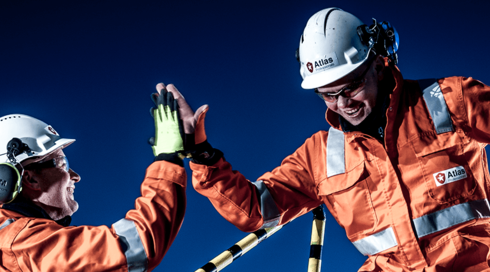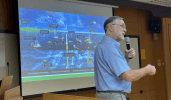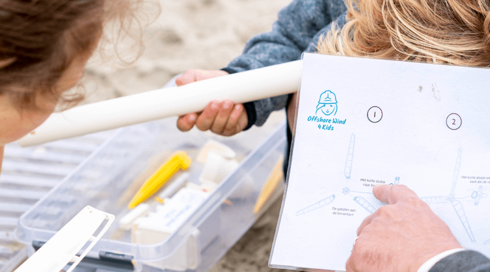13 February 2020
CMS is one of the largest high-quality legal and tax service providers in the world specialising in the renewables sector in the Netherlands, including onshore and offshore wind energy, solar energy and other sustainable energy sources such as biomass. The Dutch practice, based in Amsterdam, is part of the international CMS group, which is one of the largest law firms in the world.
In the Netherlands, CMS works with leading energy companies, regulators, public entities, large buyers and investors and helps to build legal frameworks for the energy sector. The firm is an active member of NWEA (the Dutch Wind Energy Association), IRO (the Association of Dutch Suppliers in the Upstream Oil and Gas Industry and Offshore Renewable Industry) and ESNL (Energy Storage Nederland).
Heroes Magazine interviews Barbara Veldmaat and Fleur van Assendelft de Coningh who are both specialised in employment law, particularly in relation to the energy sector. Barbara has been with CMS for 15 years, while Fleur joined the firm in 2011.
First Dutch offshore wind tender
International CMS teams have been involved in several major renewable energy projects and transactions including the first Dutch offshore wind tender and the acquisition, development and project financing of the largest solar energy park. In 2018, ENERCON acquired the Dutch wind turbine manufacturer Lagerwey B.V. and CMS advised ENERCON concerning the due diligence of the Lagerwey Group. In addition, the CMS team advised the company on the negotiations and completion of the strategic partnership.
The firm also provided Partners Group, the global private markets investment manager, with comprehensive legal advice with regards to the acquisition (on behalf of its clients) of a substantial interest in the Dutch company owning the project rights for the offshore windfarm 'Borssele 3&4'. CMS has also advised Merkur Offshore GmbH in connection with the revised financing of the construction and the operation of the offshore wind farm ‘Merkur’. Separately, CMS advised DONG Energy on the preparation for the combined bid on Borssele 1&2. Next to this, CMS also provides expert advice regarding the energy storage sector.
CMS and Atlas Professionals regularly work closely together concerning issues surrounding labour law and on various projects. Barbara and Fleur comment that, although the renewables industry – particularly offshore wind – has matured more, the legal framework in the Netherlands still lags behind a little when it comes to employment law.
“Working hours at wind parks and collective bargaining agreements are very much hot issues at the moment,” Barbara stresses. “For example, does a mandatory pensions scheme apply?” There is also the added complexity that some wind farms located off Zeeland in the Netherlands are very close to Belgium too, so the team has to consider whether Dutch or Belgian law could apply. “Clients of course want to know the difference between the legal situation in each country when they participate in tenders.”
Optimising working conditions
Gradually there is more clarity about the legalities surrounding wind farm developments, Fleur points out, with more being done to optimise the working conditions of people working at wind farms.
Staffing is another major issue the lawyers are addressing. “A wind farm gets developed but then there is the question about how it will be staffed when it comes to O&M etc. Do developers hire their own people or work via a temporary staffing agency? Then what are the staffing liabilities.”
Barbara explains: “It is often tricky because many people get hired in on a project by project basis, but in offshore wind a project could run for three years. I think Dutch law is a little behind in terms of clarity here i.e. is this a service agreement rather than an employment agreement?”
Additionally, there is the complex issues concerning these multinational developments, which employ a mixture of expats and locals. Expats working on a wind farm may be registered in an entirely different country to where the wind farm is. “But if someone gets sick, which law applies?”
New employment law
The team are preparing for a big change in employment law (the Wet arbeidsmarkt in balans (WAB)) in the Netherlands which will be introduced on 1 January 2020. Fleur comments: “A lot of things will change and this will have a big impact on employment law in the renewables sector. Easier dismissal, indefinite contracts, higher severance payments and the legal status of on-call employees are all elements being reviewed.”
Mergers & Acquisitions (M&A) in the sustainable sector are also keeping CMS busy, Barbara stresses. “Here we carry out all employment checks, handle all sorts of co-determination issues and look for hidden liabilities. M&A activity is really on the rise, particularly in the energy sector and many private equity funds are interested in renewables.”
Both emphasise the added value that CMS can bring to the renewables sector. “We believe our clients benefit because we have a worldwide network focusing on energy and we always work in interdisciplinary teams. We know the business in depth and can solve problems because we do these projects all of the time. We have tax specialists, notaries and attorneys, all of whom specialise in energy. Often renewables projects involve the same international players so CMS can also assist globally if wind farm developers in the Netherlands are starting up projects in the US and Asia for example.”
.png)
.png)


